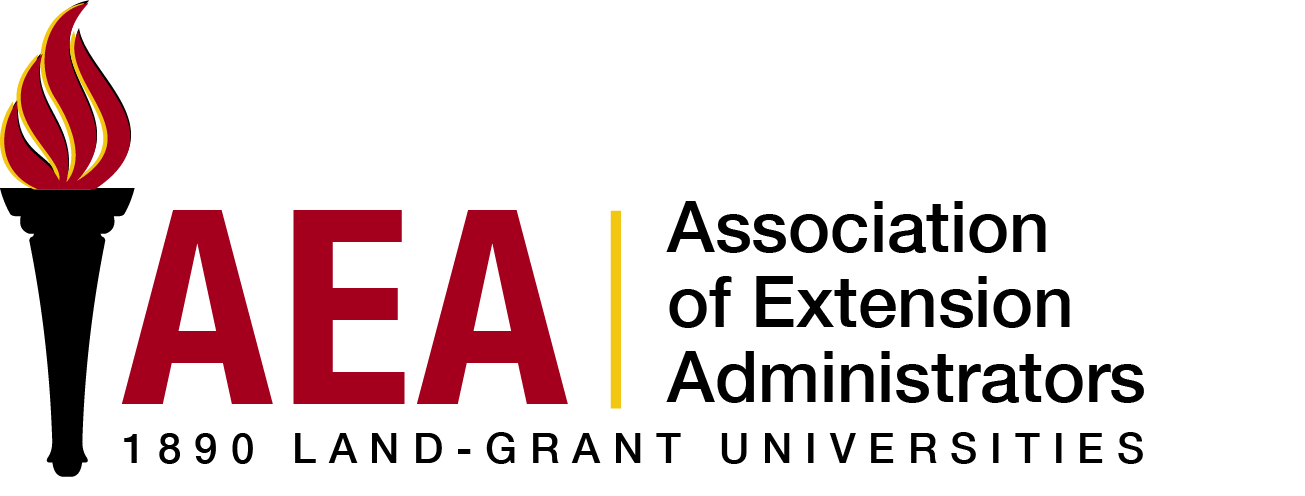Extension Today
News from and about the 1890 Land-Grant Extension SystemMessage from the Chair

Dr. Raymon Shange, 1890 Extension Administrator, Tuskegee University
In this edition of Extension Today, we would like to shine a spotlight on the transformative power of recognition and investment within our Extension community. Across the region, Extension professionals are being honored for their innovative work, community engagement and leadership in addressing critical issues such as food security, youth development and community health/resilience. These awards not only celebrate individual and team achievements but also elevate the visibility of Extension’s role in cultivating sustainable futures.
Equally important are the resources that fuel our mission-driven work. Federal agencies, philanthropic foundations and new funding partners are opening doors for deeper collaboration, capacity building and program expansion. Whether you're seeking inspiration or resources, we hope this newsletter empowers you to pursue excellence and amplify the impact of your work in the communities we serve.
2025 AEA Excellence in Extension award winners
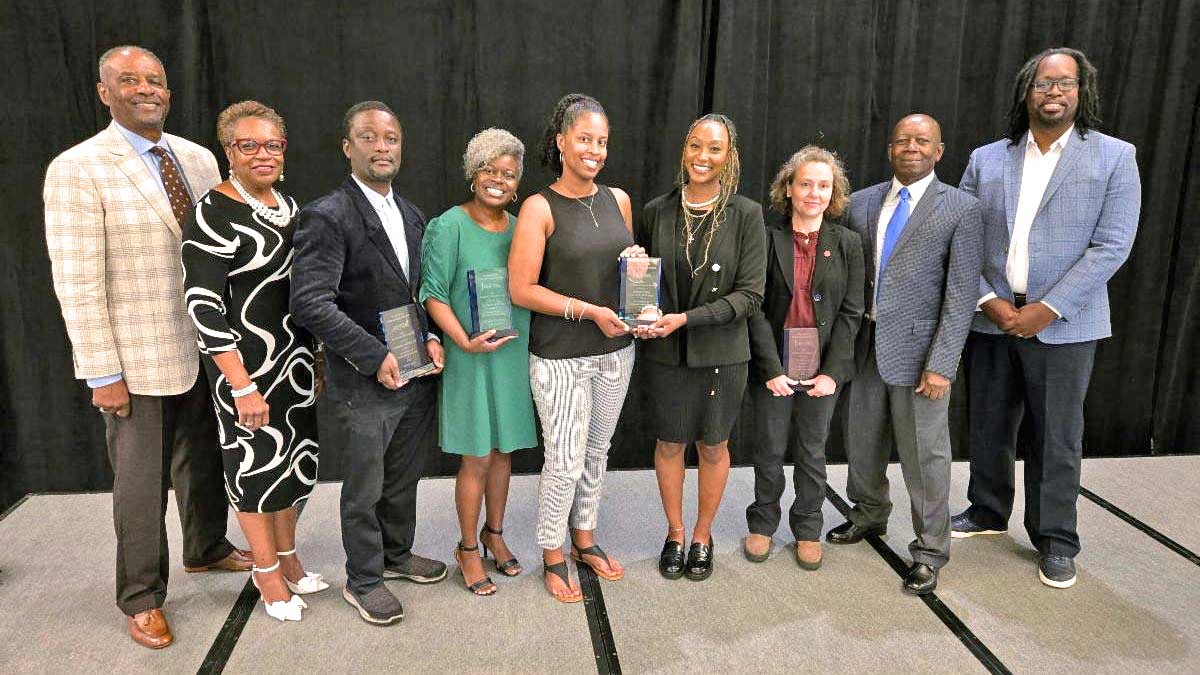
Four recipients of the 2025 Association of Extension Administrators (AEA) Excellence in Extension Awards were honored for their impactful and innovative contributions to Cooperative Extension during the Southern Region Program Leadership Network meeting held in August in Atlanta, Georgia.
Dr. Kristin Woods, food systems resource specialist at Tuskegee University, was recognized for her visionary leadership through the Carver Integrative Sustainability Center. With more than 27 years of experience, Woods has secured more than $9.5 million in funding to empower farmers across the Alabama Black Belt Food Corridor. Her work in produce safety, experiential education and sustainable agriculture continues to uplift communities and inspire future leaders. Woods was also honored as the overall 1890 winner across all program areas during the Joint agInnovation and Cooperative Extension Meeting held in September in St. Louis, Missouri.
Dr. Lindsey Lunsford, assistant professor of food systems education and policy at Tuskegee University, received the Excellence in Extension Award for her dynamic outreach and mentorship. Through the Carver Integrative Sustainability Center-Inter-Institutional Network for Food, Agriculture and Sustainability HBCU Fellowship Program, she has expanded student opportunities and built national partnerships that bridge academia and community. Her commitment to equity and innovation strengthens Tuskegee’s mission and impact.
Delaware State University’s family and consumer sciences team earned the team award for their responsive, culturally competent programming. Tackling chronic disease, food insecurity and parenting education, they reached more than 16,000 individuals through initiatives like the Expanded Food and Nutrition Education Program and diabetes self-management.
Dr. Rukeia Draw, program leader for 4-H youth development at Prairie View A&M University, was honored for her transformative leadership. With more than $17 million in funding secured, Draw’s compassionate approach has elevated youth engagement and mentorship statewide. Her visionary work sets a national standard for excellence in 4-H programming.
Celebrating 135 years of impact: Students compete in Cyber and AI Games for Agriculture Challenge
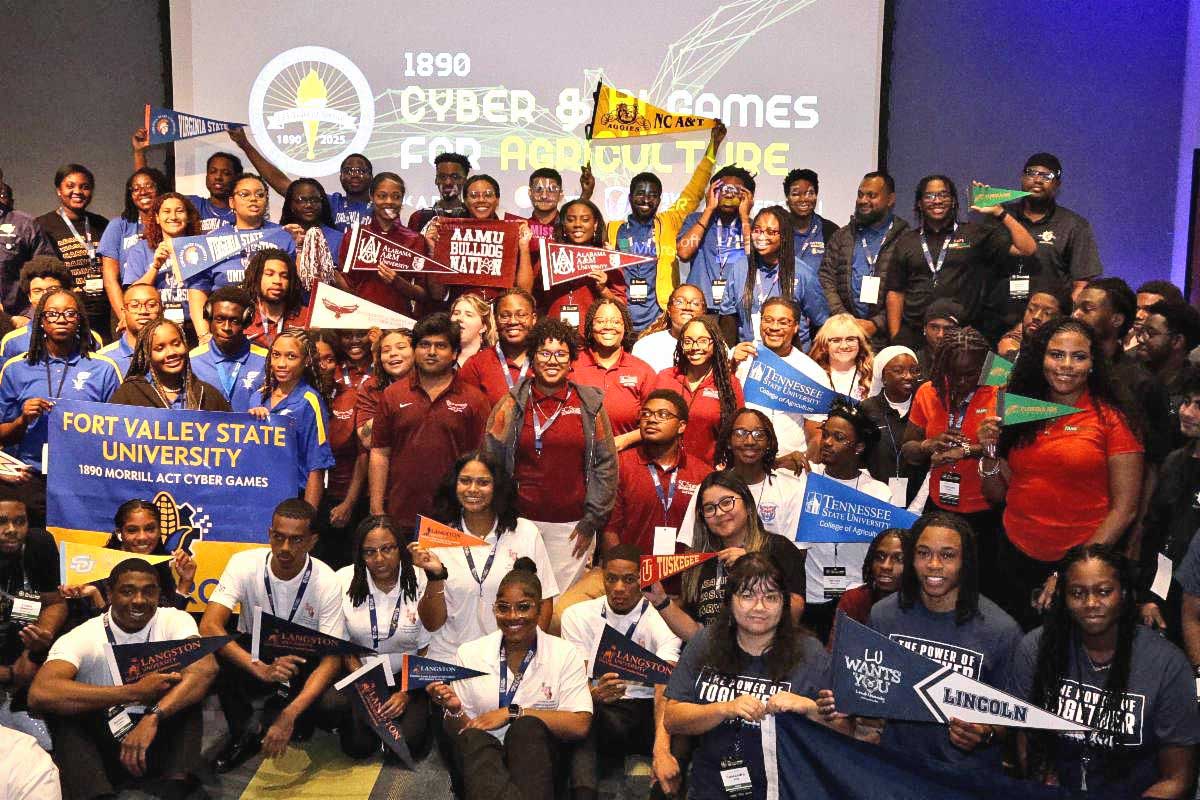
Students from the 1890 Land-grant Universities competed in cybersecurity challenges in Washington, D.C., on Sept. 9-10 as part of the 135th anniversary of the Second Morrill Act. Hosted by the University of the District of Columbia (UDC) and organized by PlayCyber with support from Kaplan, the event spotlighted threats to U.S. agriculture and food systems.
Alabama A&M University's Team 25 Hackstreet won first place, followed by Florida A&M University's Team AgriBytes in second and Fort Valley State University's Team ByteCrops in third. Students from the 19 universities and UDC participated, showcasing their skills and dedication in a celebration of the legacy and impact of the 1890s.
Celebrating Alabama Extension’s 2025 award recipients

Working for an organization like Cooperative Extension — where lives are impacted every day — is incredibly rewarding. That sense of purpose becomes even more meaningful when these efforts are recognized by your colleagues and professional organizations. That is why it is always an honor to celebrate the outstanding awards and achievements of Alabama Extension staff over the past year in this special edition of Extension Today.
Award recipients
- Danielle Rudolph, site director for the Virginia Caples Lifelong Learning Institute, was honored with the 2025 Leader Award from the American Association of Family and Consumer Sciences Alabama Affiliate.
- Urban Regional Extension Agents Tierney Donnell and Darlene Minniefield received the Community Partnership Award from the Hawk Houston Youth Enrichment Center. Additionally, Minniefield earned a 2025 Distinguished Service Award from the National Extension Association of Family and Consumer Sciences.
- Angela Kelly, a dedicated Alabama 4-H agent, guided a 5th-grade class at Chisholm Elementary in Montgomery to first place in their school’s science fair with their “Squishy Circuits” project, qualifying them for district competition.
Extension agents earn grant awards
Hayes Jackson secured $81,000 in grants, including $40,000 from the Ginn Family Foundation. Marcus Garner received $10,000 for his Water Wheels Upgrade project. Pam Irby was awarded $5,250 to support financial education initiatives at the Day Reporting Center in Mobile, Alabama.
Congratulations to all for your hard work and well-deserved recognition!
Alcorn State University 4-H receives $124,000 Beyond Ready grant

Alcorn State University’s 4-H Youth Development Program secured a $124,000 Beyond Ready grant — an investment that is already shaping the future of Mississippi’s young people.
With this funding, the Alcorn 4-H team leads a statewide initiative that delivers leadership development, academic engagement and community connection for young people across rural Mississippi. The team coordinates every aspect of the project, from developing engaging curriculum and training facilitators to recruiting participants and measuring program impact.
“This award allows us to strengthen how we prepare young people to lead and succeed,” says Manola Erby, assistant director for Extension/1890 4-H program leader. “We are creating pathways that build confidence, expand school engagement and grow tomorrow’s community leaders.”
Community partners, schools and Extension educators step up to support outreach, host events and help shape the program’s direction through feedback and collaboration. This joint effort ensures that the initiative is rooted in local needs and designed for long-term sustainability.
The Beyond Ready initiative is not just about programming — it is about transformation. Youth participants show increased goal-setting skills, improved communication and a greater sense of belonging. The program strengthens youth-adult relationships, enhances academic performance and builds stronger ties between schools, families and communities.
By creating a scalable 4-H model that meets the unique needs of rural communities, Alcorn State University positions Mississippi’s young people to thrive today and for years to come. For more information, contact Erby at mcerby@alcorn.edu.
Dr. Sabrina Hayes named southern region director of national board

Florida A&M University 4-H Youth Development Extension Agent and Entomologist Dr. Sabrina Hayes has been appointed to serve as the 2025–27 southern region director for the National Association of Extension 4-H Youth Development Professionals (NAE4-HYDP).
Hayes is recognized for her innovative youth programming that blends science, technology, engineering and mathematics (STEM) education, leadership development and civic engagement. Through hands-on camps, in-school programs and teen leadership initiatives, she inspires curiosity, builds confidence and equips young people with workforce and life skills. Her approach emphasizes creating safe, engaging spaces where young people can grow, develop resilience and explore their potential.
Her leadership and dedication have produced measurable impacts in character development, STEM literacy and youth empowerment across Florida. She continues to be a consistent, caring adult presence for young people, fostering opportunities that prepare them to thrive in an ever-changing world. Hayes will begin her official term as southern region director immediately following the NAE4-HYDP Annual Conference in October 2025 in Atlanta, Georgia.
Restoring forests, building futures at FVSU
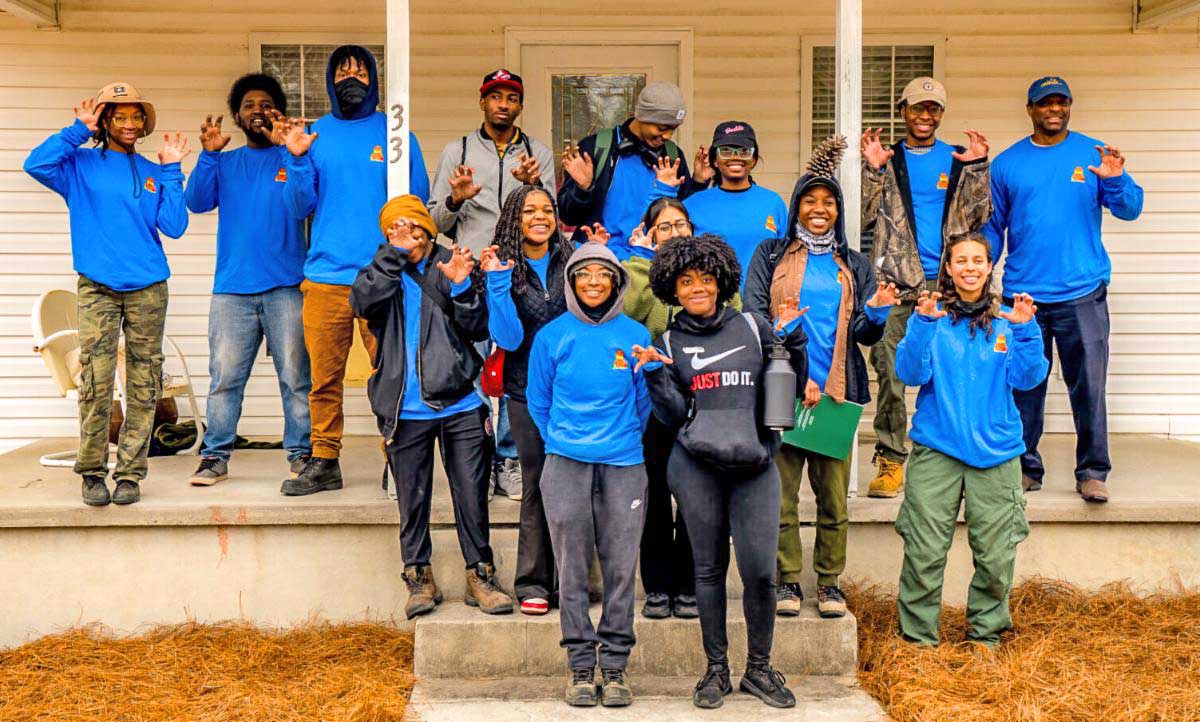
Fort Valley State University (FVSU) is taking bold steps in forestry restoration and sustainability across its 600 acres of forestland. In 2023, Dr. Cedric Ogden, assistant professor of engineering technology, partnered with the Georgia Forestry Commission to assess the health and biodiversity of FVSU’s forests. This fieldwork led to the development of harvest maps recommending the reforestation of 125 acres.
With support from the National Wildlife Federation (NWF) and the Longleaf Alliance, FVSU secured grant funding through the Longleaf for All initiative to replant these areas with longleaf pine, an ecologically resilient species known for its resistance to pests, drought and storms. In July 2025, Piedmont Forestry in Macon, Georgia, was awarded the bid to clear-cut and replant five forestry tracts.
This transformation goes beyond conservation. The project integrates innovative agroforestry practices and technology demonstrations, turning the forest into a living laboratory for students and landowners. It also sparked the creation of the FVSU FireCats, a student-led organization focused on forest ecology and fire management. Students are already gaining hands-on experience through workshops, forest inventory and prescribed burns led by the NWF and U.S. Forest Service.
FVSU’s forestry initiative is a model for environmental stewardship, education and economic development, empowering future leaders while strengthening community resilience and supporting forest-based industries.
From fields to markets: KSU grants strengthen agriculture
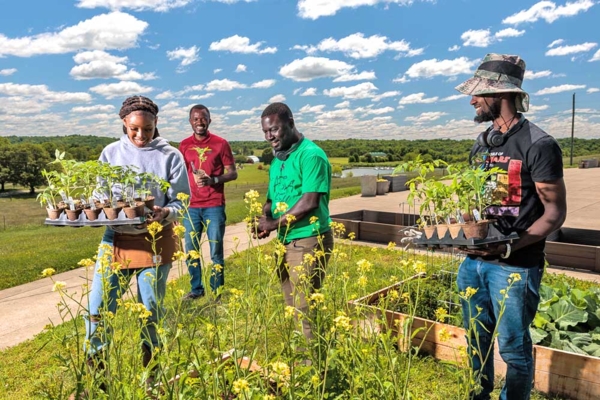
Kentucky State University’s Cooperative Extension Program is advancing farmer training and workforce development through two recently awarded grants led by Dr. Siddhartha Dasgupta, associate research director and professor.
The first, Farming for Cash, builds on more than a decade of success training beginning farmers across Kentucky. Funded through the U.S. Department of Agriculture’s (USDA) Beginning Farmer and Rancher Development Program, the project provides year-round, hands-on education in commercial vegetable production. Farmers from Lexington to Paducah learn how to establish profitable operations within just 12 months, equipping them with the knowledge and tools to sustain their businesses and communities.
A newly awarded USDA 1890 Capacity Building Grant expands this impact into a growing area of need: production of vegetables for specialty markets. With existing research on consumer demand and graduate-level studies already completed, Dasgupta and his team are poised to help Kentucky farmers grow crops with high market potential. Training focuses on production practices, packaging, marketing and the economics of profitability, ensuring that growers are ready to meet customer needs across the Commonwealth.
Together, these initiatives strengthen Kentucky State’s mission to support farmers, promote innovation and extend research into real-world solutions.
Langston University empowers 4-H Extension educators with AI training, innovation
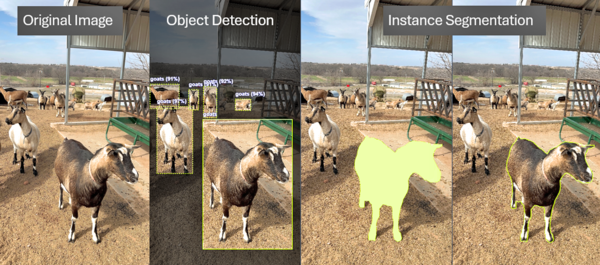
By Dr. Carlos E. Alvarado
Langston University’s Sherman Lewis School of Agriculture and Applied Sciences (SL/SAAS) is taking bold steps to integrate artificial intelligence (AI) into Extension education in alignment with the recent federal directive to strengthen AI capacity through 4-H programs.
This initiative features two complementary components:
- Student-led research: Undergraduate student De’Janique Lambeth, who recently completed a competitive Research Experience for Undergraduates (REU) program at the University of Illinois, is spearheading a project to develop a computer vision model capable of recognizing goats. Partnering with two small dairy goat farmers in Oklahoma County, she is capturing images and videos of different goat breeds to train the model. This pioneering work lays the foundation for practical AI applications that will help farmers enhance herd management and productivity.
- AI-Bridge Boot Camp: A hands-on training series designed for SL/SAAS faculty, technicians and Extension staff, including 4-H instructors. Participants will gain essential skills in Python programming and machine learning using real farm data. This training equips them to introduce AI concepts to both young people and farmers across Oklahoma.
By uniting student-led innovation with workforce development, Langston University is preparing Extension professionals and 4-H leaders to embrace cutting-edge technologies. This effort not only makes AI education accessible to rural communities, farmers and young people but also fosters the next generation of agricultural leaders.
Through this project, Langston University is ensuring that rural communities have the tools to thrive in an AI-driven future, strengthening the sustainability and resilience of agriculture.
Awards highlight impact of Lincoln University Extension programs across Missouri
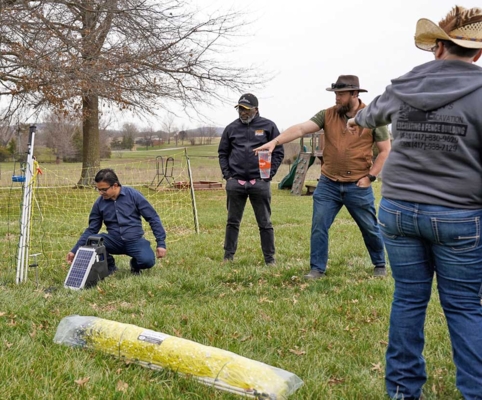
Lincoln University Cooperative Extension leads several Sustainable Agriculture Research and Education (SARE) projects aimed at boosting knowledge, resources and production efficiency among Missouri’s sheep and goat producers.
One such project is a three-year SARE-funded initiative, Sheep and Goats Master Training Programs in Missouri, with a total award of $91,926. Dr. Mohan Acharya leads the project, which began in October 2023 and will run through October 2026. It focuses on equipping trainers with expertise in parasite management, forage production and soil nutrition, as well as marketing strategies.
Acharya also leads Fencing in Silvopasture for Sheep and Goat Production Across Missouri, a separate but complementary project awarded $49,896 through October 2025. The project aims to train producers in installing and managing fencing and water systems in silvopasture environments — a method integrating trees, forage and livestock.
The Midwest Small Ruminant Educational Program Initiative (Midwest-SREPI), another ongoing project, is led by Dr. Homero Salinas-Gonzalez. With a $249,285 grant, this program runs from January 2024 through January 2027 and focuses on enhancing regional collaboration and producer education.
All three programs reflect LUCE’s continued commitment to supporting underserved and small-scale producers throughout the region by providing accessible, research-based training and technical assistance.
N.C. A&T launches Agriculture Business Innovation Center with 1890 Land-grant University partners
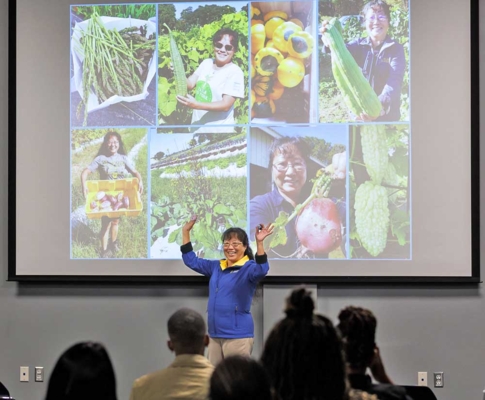
André Davis is excited to see the launch of the Agriculture Business Innovation Center (ABIC) at N.C. A&T.
“I know that it’s going to help benefit me,” said Davis, owner of Drozik’s Urban Farm in High Point, North Carolina. “I’m looking forward to it because (the ABIC team has) that drive or that initiative that I need to get me to the next level.”
Davis attended the launch of the center at North Carolina Agricultural and Technical State University on Sept. 17. The center is administrative (not brick-and-mortar) and serves as a hub, offering assistance to agriculture-based businesses nationwide, with a primary focus on small-scale farming and related enterprises. It aims to encourage innovation and facilitate workforce development training.
“In this launch, it’s not just about the opening of a center,” said Radiah C. Minor, Ph.D., interim dean of A&T’s College of Agriculture and Environmental Sciences. “It’s about opening doors, breaking old paradigms, embracing technology, data and science — building a future where agriculture is inclusive, resilient and thriving.”
The U.S. Department of Agriculture’s National Institute of Food and Agriculture awarded $1.92 million to A&T to establish the center in partnership with three other 1890 Land-grant Universities: Kentucky State, Alabama A&M and West Virginia State.
The center will provide both virtual and in-person technical assistance in such areas as food and agricultural production, business planning, market development, funding opportunities and workforce development.
It also houses a virtual Agribusiness Entrepreneurship Academy, said Alex Meredith, Ed.D., ABIC managing director. The academy will help students learn about and prepare for working in agricultural entrepreneurship.
Celebrating excellence: Award-winning leadership of Dr. Rukeia Draw
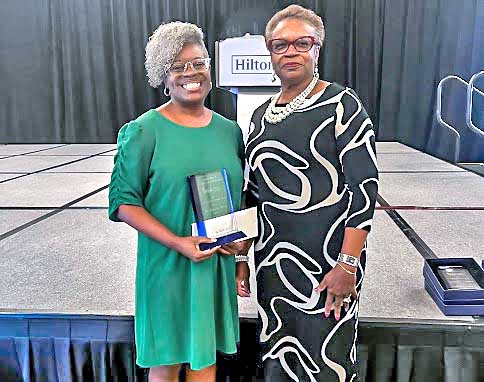
Prairie View A&M University (PVAMU) Extension is celebrating Dr. Rukeia Draw for receiving the Excellence in Extension Award from the 1890 Association of Extension Administrators at the Southern Region Program Leadership Network meeting.
Draw is a prominent figure in the Extension 4-H program, significantly impacting youth development with her expertise in social relations and non-formal/Christian education. As the leader of the first urban 4-H Community Center in Detroit, she fostered an inclusive, engaging environment. At PVAMU, she spearheaded initiatives in science, technology, engineering and mathematics (STEM), college readiness and community collaboration, securing more than $15 million in funding and increasing youth participation throughout Texas. Her compassion, teamwork and belief in others highlight her exceptional leadership.
Additionally, PVAMU Extension received the esteemed 2025 Presidential Awards at the annual Faculty and Staff Conference. This gathering honored faculty and staff for their outstanding contributions and unwavering commitment to excellence.
SC State PSA honors Fairwell and Finley as Employees of the Quarter
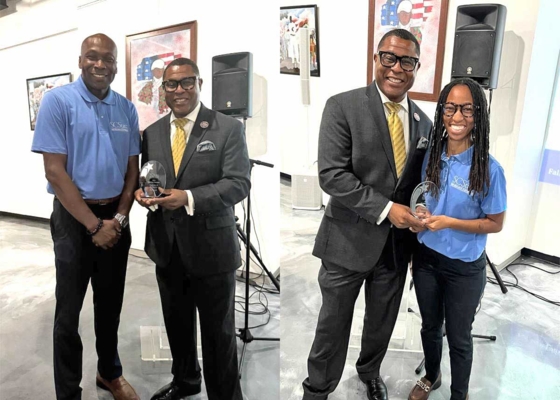
South Carolina State University Public Service & Agriculture (SC State PSA) recognized Michael Fairwell, director of integrated media, and Daisha Finley, digital media strategist, as Employees of the Quarter for their contributions to the organization’s communications and media efforts.
Fairwell is responsible for overseeing comprehensive media strategies that blend traditional and digital platforms to deliver cohesive, engaging experiences to PSA’s audiences. With more than 30 years of experience, he leads innovative projects such as Growing Palmetto, a web series showcasing the impact of SC State PSA, and Elevate Leadership, a podcast that advances conversations on entrepreneurship and leadership development.
Finley manages digital and social media content for SC State PSA while also overseeing event photography, writing press releases and producing stories that highlight the agency’s work. A Charleston native and graduate of Winthrop University, she brings a strong background in graphic design, illustration and digital artistry to her role, ensuring PSA’s stories are told through creative and impactful visuals.
“I am honored to be recognized with this award,” Fairwell said. “It is a privilege to work alongside such talented colleagues and to use media as a way to showcase the important work PSA is doing for South Carolina communities.”
“Being able to tell the stories of SC State PSA is meaningful work, and I am grateful for the opportunity to contribute to the agency’s mission. This award motivates me to keep learning, growing and giving back,” said Finley.
Together, Fairwell and Finley represent the creativity, innovation and collaboration that drive SC State PSA’s mission to serve, educate and elevate communities across South Carolina.
Providing Resources and Opportunities through Partnerships, Locally
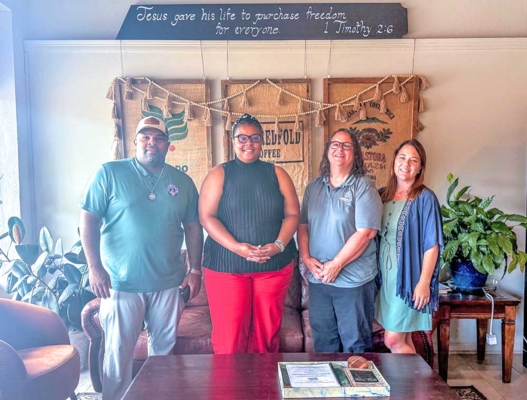
The Providing Resources and Opportunities through Partnerships, Locally (PROPEL) Initiative, through the Delta Regional Authority (DRA), in collaboration with the Southern Rural Development Center (SRDC), is advancing workforce and economic development in Ville Platte and Lake Providence, Louisiana. This work is being implemented by a strong technical assistance team that includes the Community and Economic Development of the Southern University Agricultural Research and Extension Center in partnership with the LSU AgCenter. Together, they are providing hands-on support to strengthen local capacity, drive economic resilience and prepare these communities for sustained growth.
As part of this effort:
- Local elected officials are working closely with the team to align project priorities and identify eligible opportunities under federal funding programs.
- Workforce and economic development goals are central to this initiative, including support for workforce training pipelines, small business development and infrastructure planning.
- Area residents receive coaching, technical assistance and access to planning tools and grant development training to help build long-term local capacity.
- These communities are now eligible for up to $75,000 through the Delta Catalyst Fund, a competitive opportunity that supports small-scale, high-impact projects in infrastructure, workforce and business development.
- This funding would not be available without the communities' engagement in PROPEL, making this partnership a key pathway to unlocking strategic investment.
By investing in leadership, skills, infrastructure and local planning capacity, the PROPEL initiative, powered by the Southern University Ag Center, LSU AgCenter, SRDC and DRA, is creating a foundation for sustainable economic opportunity and community advancement in Louisiana's rural Delta.
TSU’s Dr. Dilip Nandwani named 2024 ASHS Fellow
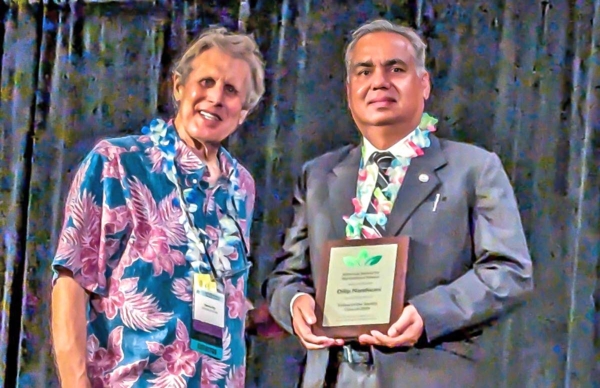
Dr. Dilip Nandwani, professor of organic agriculture at Tennessee State University, has been named a 2024 American Society for Horticultural Science (ASHS) Fellow, the highest honor awarded by the organization. He is the first scientist from a historically Black college and university (HBCU) or an 1890 Land-grant University to receive this distinction.
“I am honored to be recognized by the American Society for Horticultural Science as a fellow,” said Dr. Nandwani. “This award acknowledges 30 years of teamwork in horticultural research, Extension and teaching, emphasizing our commitment to advancing society through horticultural education and principles.”
One of just eight scientists named fellows in the 2024 class, Nandwani will be honored during the ASHS Annual Conference in September. At TSU, he manages the university’s certified organic farm, which supports research, teaching and training in fruits, vegetables and herbs.
Since joining TSU in 2014, Nandwani has secured more than $25 million in competitive grants; led projects in climate-smart agriculture, urban and vertical farming, and international development; and overseen agency-funded programs. His work has reached more than 25,000 stakeholders across Tennessee through field days, workshops and training sessions.
An accomplished mentor, Nandwani has guided 15 graduate students and numerous undergraduates and interns, while also publishing more than 300 scholarly works and editing four books. He serves as editor of Organic Agriculture (Springer Nature) and sits on several national and international boards.
Nandwani’s recognition as an ASHS Fellow underscores both his global impact in horticultural science and the growing prominence of TSU’s College of Agriculture in advancing research, education and service.
Tuskegee University's Drs. Lindsey Lunsford and Kristin Woods honored with Excellence in Extension Awards
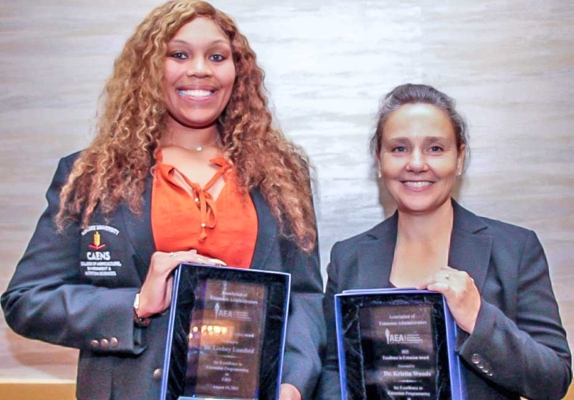
Tuskegee University Cooperative Extension (TUCEP) is proud to announce that Drs. Lindsey Lunsford and Kristin Woods are winners of the Excellence in Extension Awards for the 1890 region. Lunsford was recognized for community resource development, while Woods was honored for agriculture and natural resources. In addition to her category award, Woods secured first place overall in the 1890 region and advanced to compete across all five regional areas of the Cooperative Extension System.
Lunsford, assistant professor of food systems education and policy, is known for connecting students, scholars and communities. Her work strengthens public dialogue, student leadership and resilient food systems. She directs key initiatives such as the Carver Integrative Sustainability Center (CISC)-Inter-Institutional Network for Food, Agriculture and Sustainability HBCU Fellowship Program. Her grant work has secured more than $750,000 to support student learning and community engagement.
“This recognition reflects the collaborative spirit and dedication of the team behind me — colleagues, students and community partners,” Lunsford said. “I am excited to build on this momentum.”
Woods brings 26 years of experience in the food industry, outreach and adult education. Her career spans Tuskegee University, Auburn University and Cornell University. She has authored 25 peer-reviewed articles, more than 50 Extension publications and developed six curricula. Her learner-centered approach builds critical skills for agricultural careers.
"This recognition reflects the creativity, dedication and teamwork of my TUCEP colleagues," Woods said. "Our work is deeply collaborative and rooted in partnerships across the Alabama Black Belt and beyond."
Dr. Raymon Shange, director of CISC and TUCEP, praised both honorees for cultivating a culture of excellence and driving positive change.
Angela Howard awarded for impact on community nutrition outcomes through UAPB-EFNEP
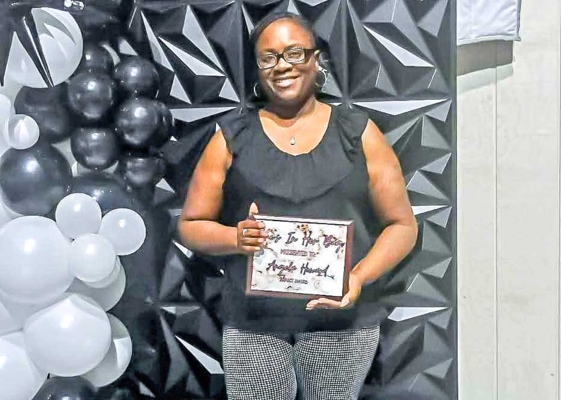
Angela Howard, Extension program aide for the University of Arkansas at Pine Bluff (UAPB), was recently recognized with a Service Impact Award by the Learning Lounge. The organization serves as a microschool in Pine Bluff, Arkansas, and recently hosted an event to recognize women making an impact on the community through acts of service, entrepreneurship, innovation and legacy.
Howard won the award for her community outreach efforts through UAPB’s Expanded Food and Nutrition Education Program (EFNEP). Her projects have focused on teaching local young people and adults about nutrition and healthy eating.
“UAPB-EFNEP delivers tangible outcomes regarding food, nutrition and public health,” she said. "Participants learn to adopt an overall healthy lifestyle. They are taught how to shop for healthy ingredients, prepare nutritious meals and participate in fun physical activities that promote overall health.”
Howard said teaching the community how to cook nutritious meals bridges her passions for education and culinary arts.
“The thing I love most about my work is when participants tell me they are still putting what they learned from my sessions into practice at home,” she said. “Some even tell me they have shared my healthy recipes with their family and friends. This lets me know that the work I am doing is making an impact. I am proud of the partnerships I have created with community supporters and treasure the public's trust.”
Virginia State University steps into new role with grant-funded EXCITE program

For several years, Virginia State University (VSU) has been addressing community health disparities and providing vaccine education through the Extension Collaborative on Immunization Teaching & Engagement (EXCITE).
The Centers for Disease Control and Prevention and the U.S. Department of Agriculture's National Institute of Food and Agriculture have provided grant funding for EXCITE for several years, as VSU has successfully completed different projects under EXCITE, including winning a national award thanks to the efforts of Human Health Specialist Tiffany Freer. Now, VSU has been awarded EXCITE funds to step into a new role as an 1890 regional sub-coordinator to help Cooperative Extension succeed in public health outreach efforts the same way VSU has so far succeeded through EXCITE projects.
Tabi Pagan is VSU’s new EXCITE regional coordinator and will be responsible for training educators across the region who will then train agents in different communities to conduct vaccine education using a curriculum that is tailored to the needs of specific communities.
“EXCITE was created in response to COVID-19 and really focused primarily on addressing vaccine hesitancy in rural communities,” Pagan explains. “But since then, it’s become a broader effort to address hesitancy surrounding all adult vaccines.”
Cooperative Extension has strong relationships with communities, individuals and partnering organizations, relying on long histories and deep roots to improve individual, family and farmer well-being with research-based approaches.
“We deliver vaccine education through trusted messengers, and we’ve developed curricula that incorporate vaccine education into topics like diabetes management and physical activity to address vaccine hesitancy in a more innovative and tailored way,” says Pagan.
Students explore nature through West Virginia wildlife education program
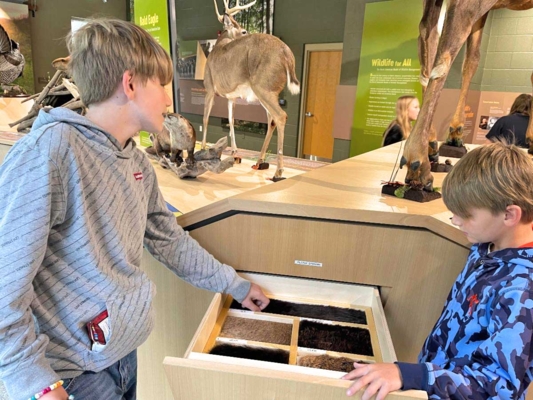
By Alisha Jarrett
West Virginia State University (WVSU) Extension Service and the West Virginia Division of Natural Resources (WVDNR) recently renewed their partnership to provide environmental education at the Claudia L. Workman Wildlife Education Center in Alum Creek, West Virginia. Launched in 2022, the cooperative agreement between the agencies will continue for a three-year term through 2028.
Led by 4-H Extension Educators Kim Smith and Brooke Phillips, the center engages young people and the public in hands-on learning. Field trips, interactive nature programs and special events make science and conservation accessible for visitors of all ages.
“West Virginia’s natural resources create the perfect classroom for young learners,” said Smith. “Educating children about the environment is key to nurturing future wildlife stewards.”
Open five days a week free of charge, the center features live reptiles, a 1,500-gallon aquarium with native fish, wildlife management displays, a bird observation area and a forest ecosystem exhibit. Smith and Phillips also manage daily operations and care for live animals.
“West Virginia’s abundant natural beauty is more than scenery — it’s a vital part of our communities and livelihoods,” said Phillips. “Inspiring young people to appreciate wildlife and the outdoors helps ensure that West Virginia will be cared for and cherished by those who come after us.”
In just three years, more than 80 school groups and 3,000 students have participated in field trips, classes, scavenger hunts and guided hikes, sparking curiosity and fostering a lasting appreciation for West Virginia’s natural treasures.
